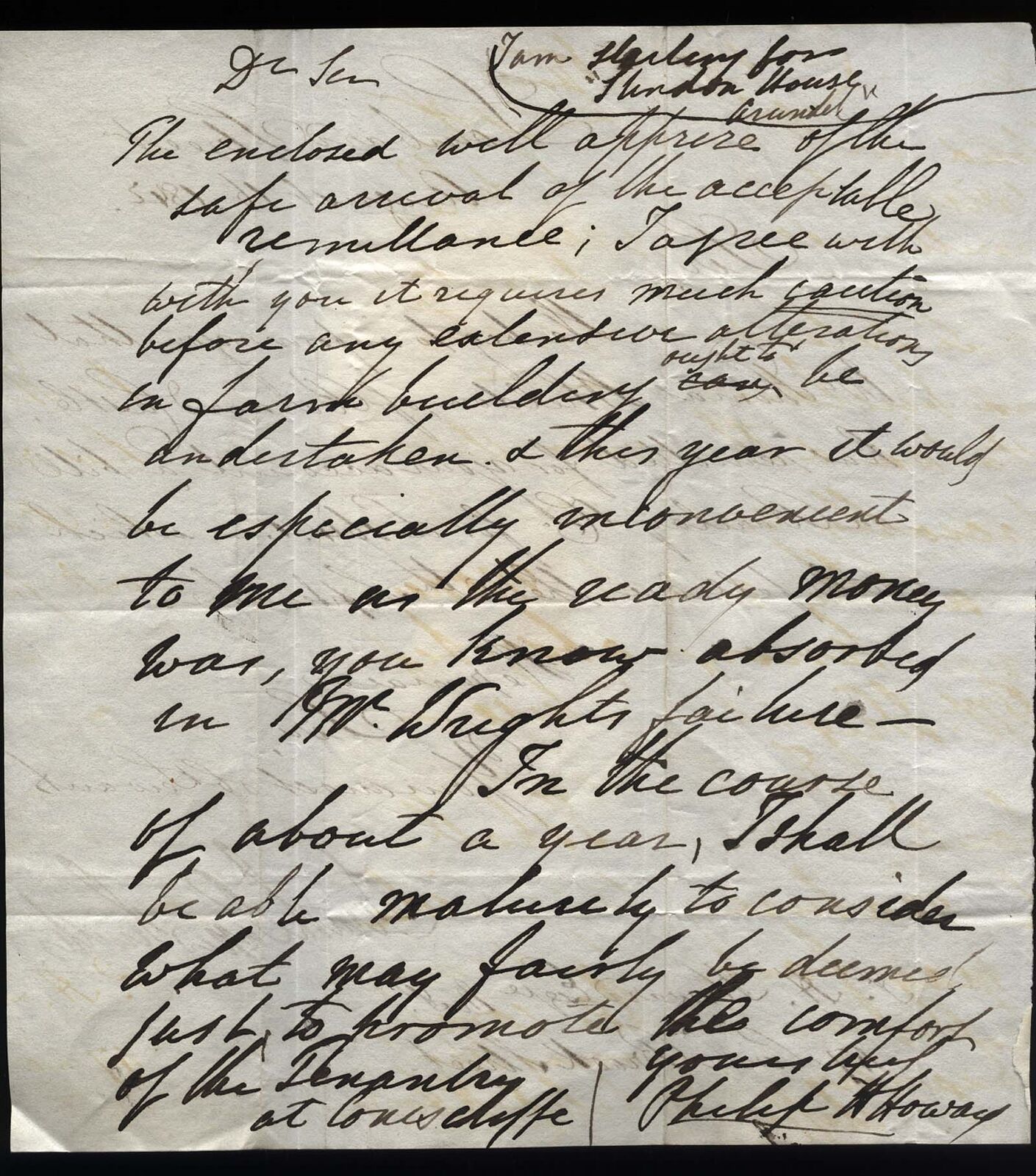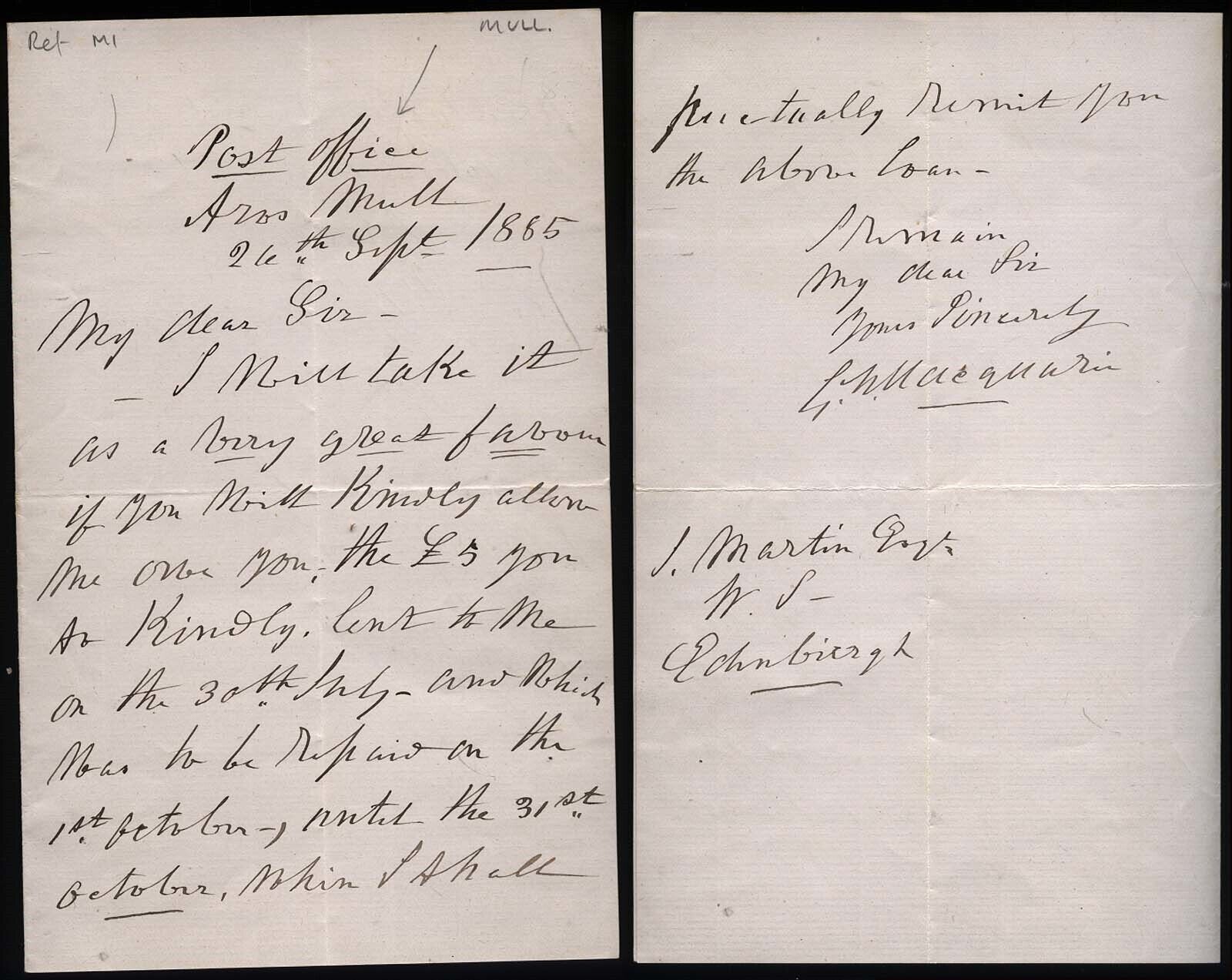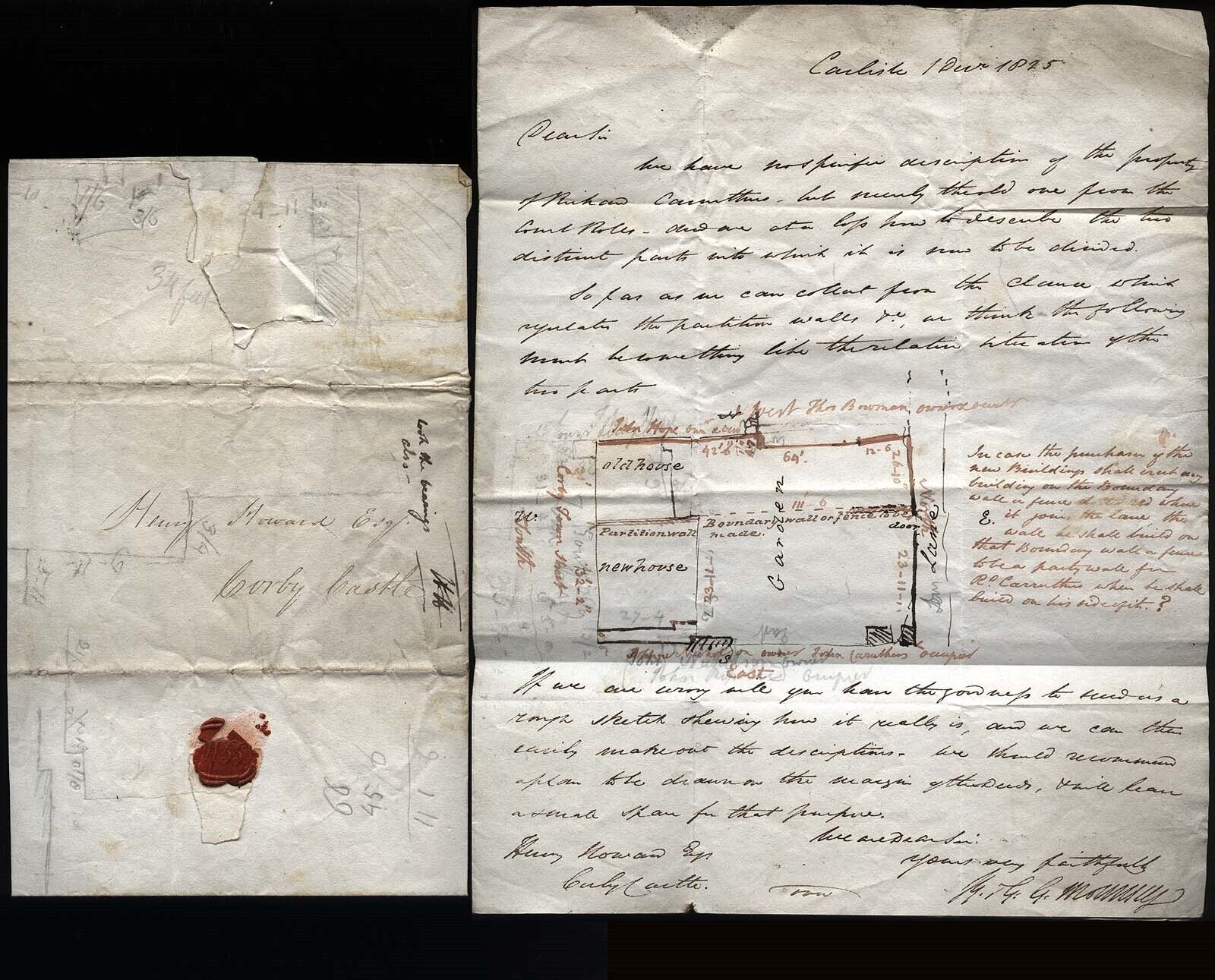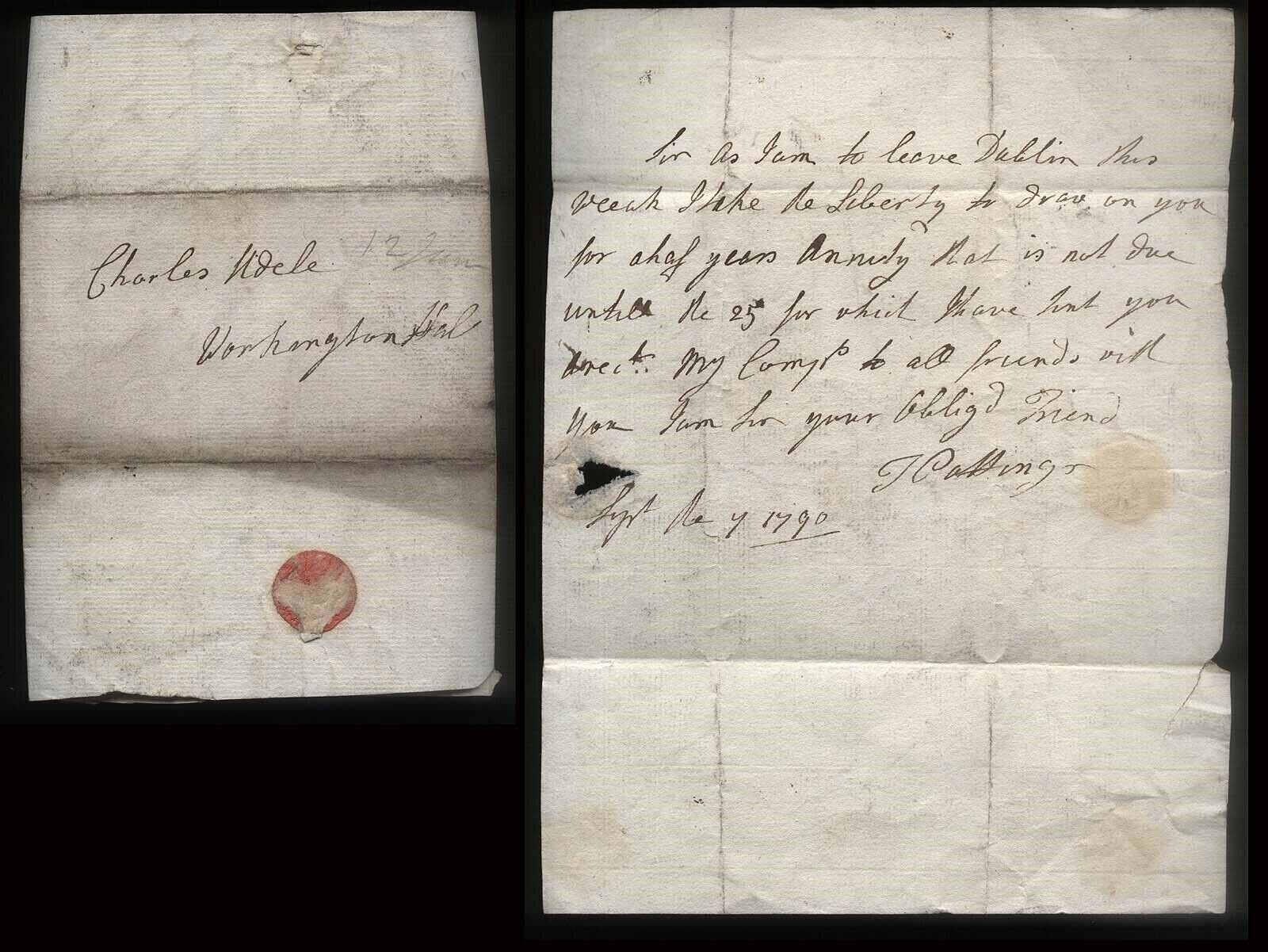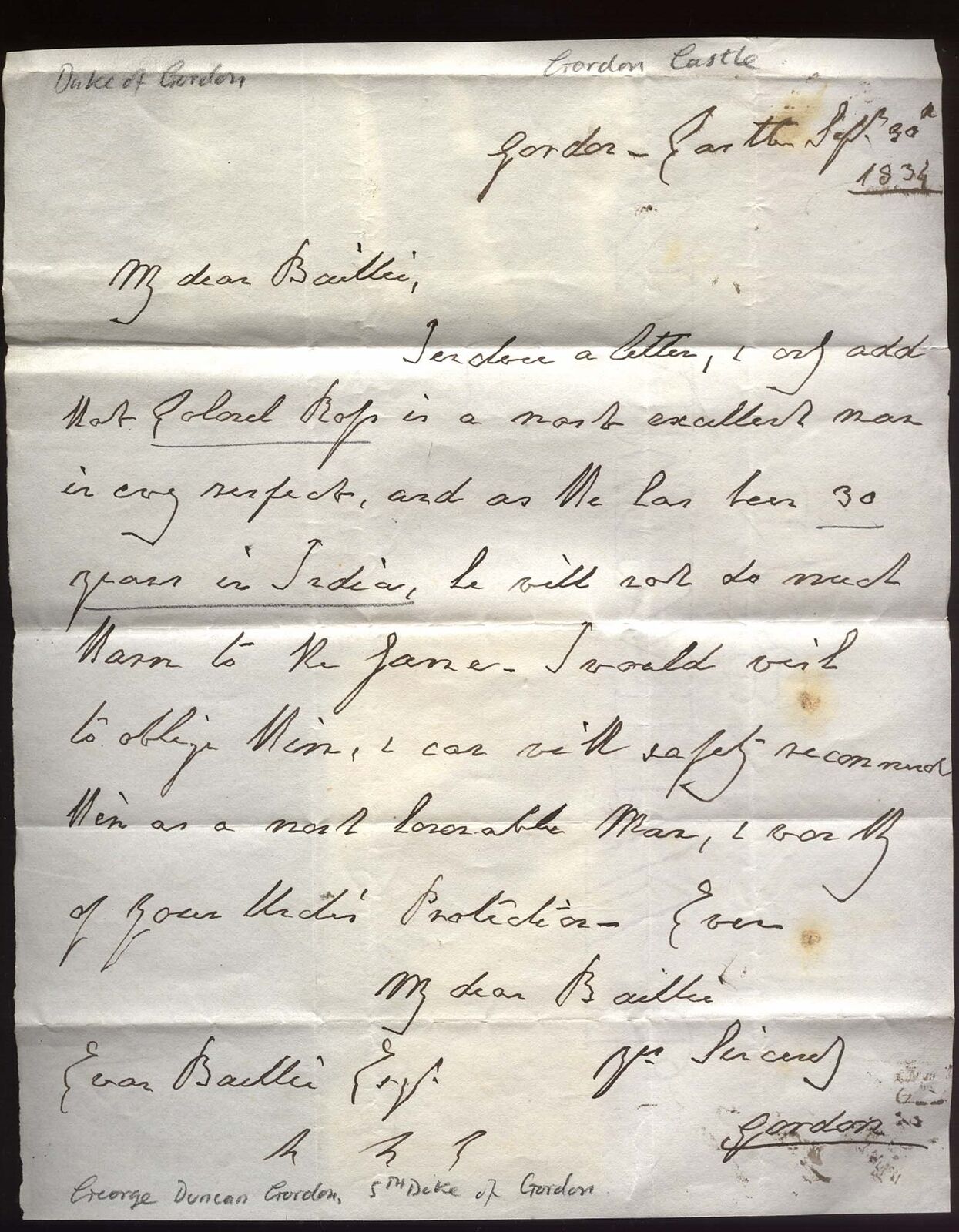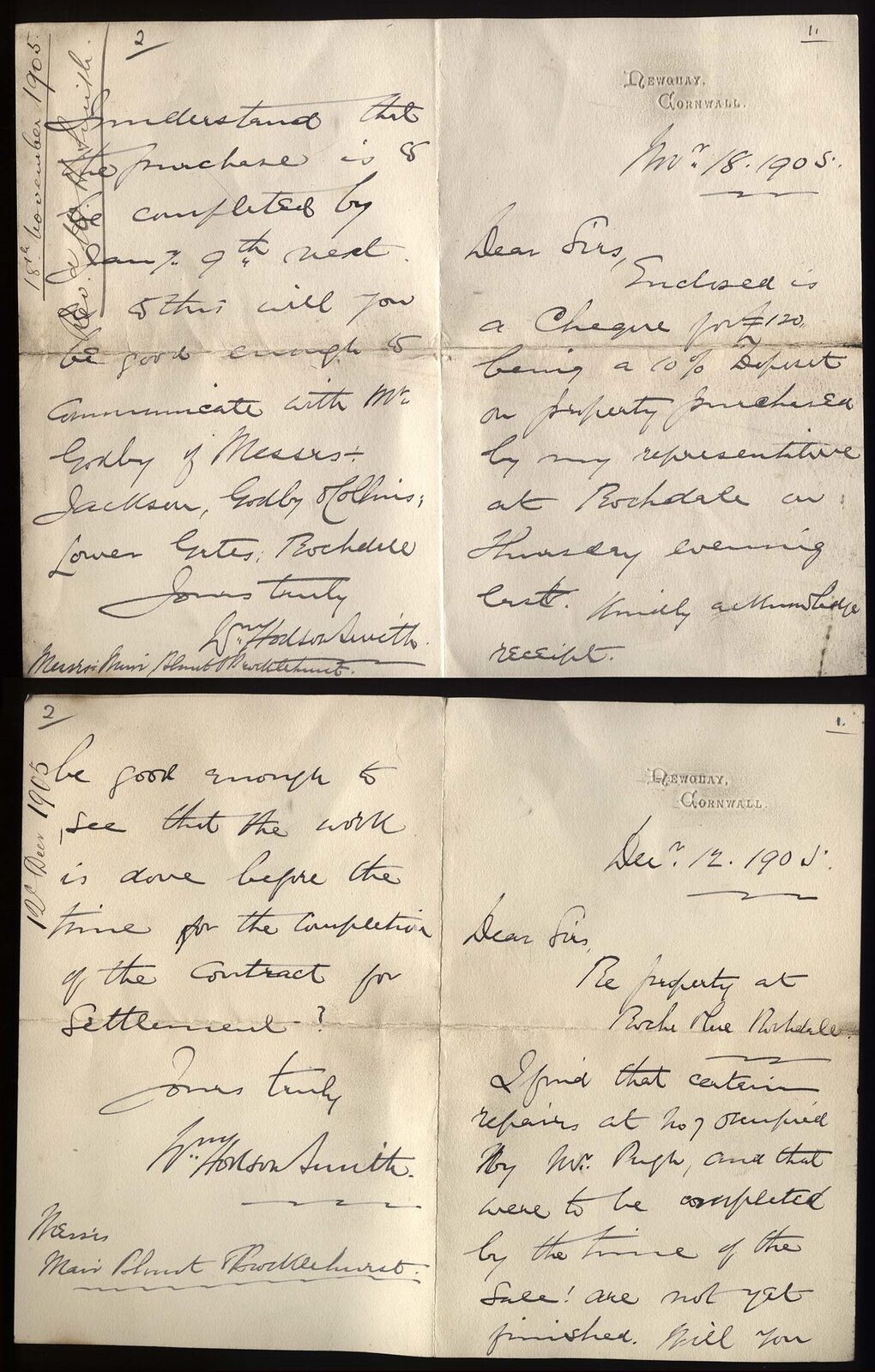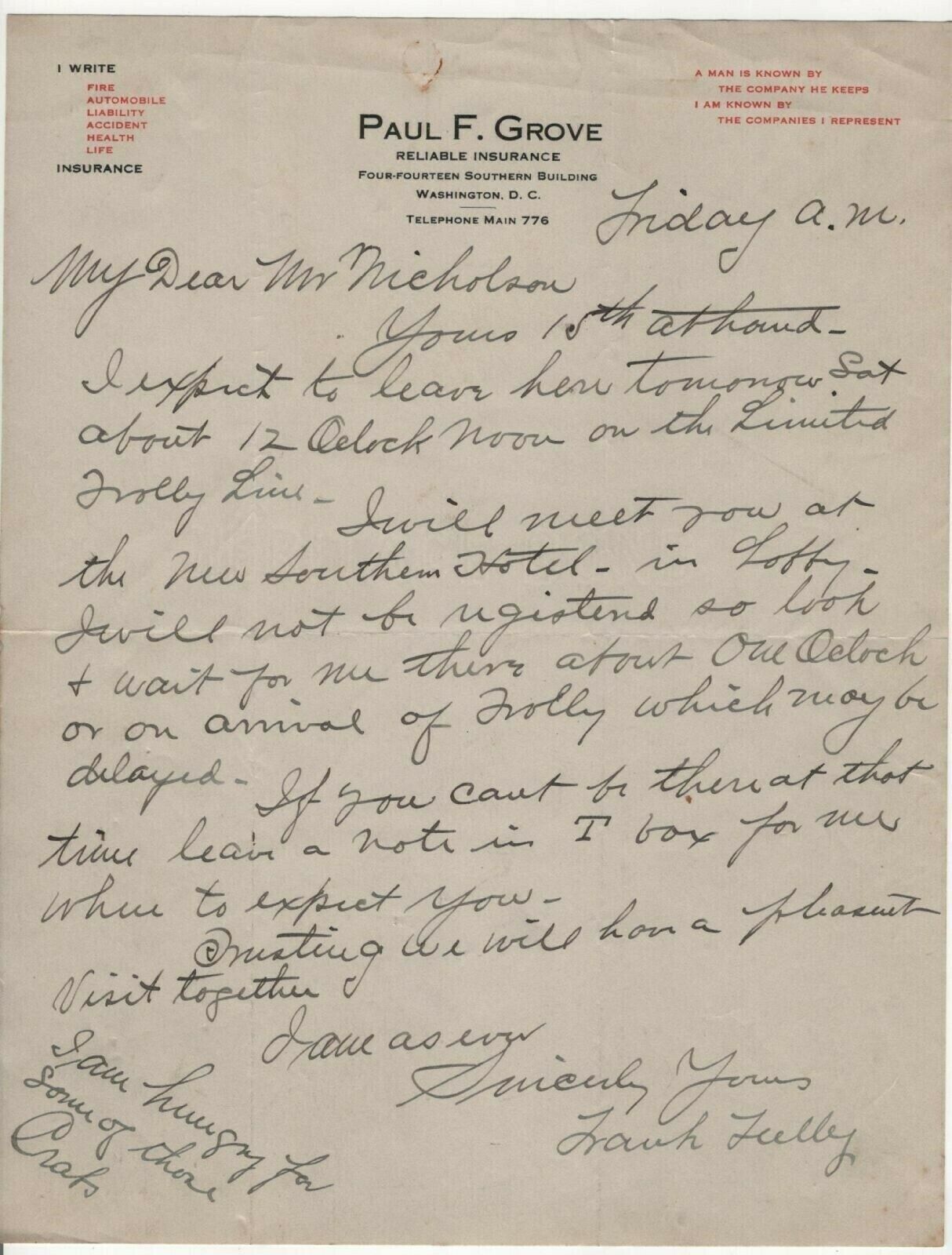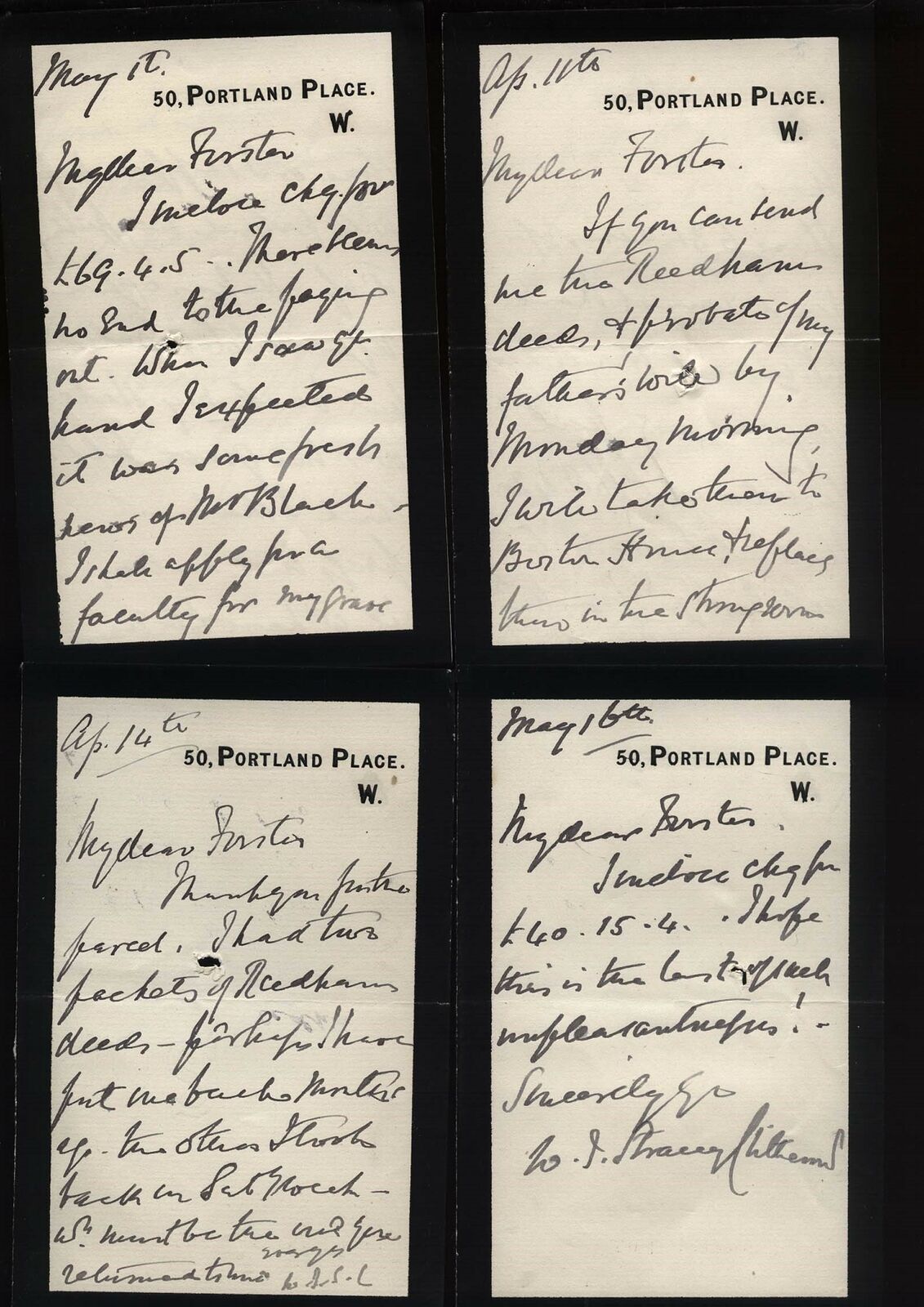-40%
1842 Philip H Howard to Thomas Wheldon re Coniscliffe Estate, Durham
$ 28.79
- Description
- Size Guide
Description
1842 Philip H Howard to Thomas Wheldon re Coniscliffe Estate, DurhamThis product data sheet is originally written in English.
1842; A Fine letter written by Philip Henry Howard of Corby Castle, to his Solicitor and agent Thomas Wheldon of Barnard Castle, for his Coniscliffe Estates in county Durham, written on the reverse of a Banking letter of remittance to Thomas Wheldon for P.H.Howard M.P. 47 Lower Brook St, London. The letter is regarding the intent to improve the Tenancy of the Coniscliffe Estate when moneny permits as he has no ready money at the moment due to Mr Wrights (Bankers) failure.
Wrights & Co (1699-1840), established in London.
This private bank was established as the goldsmithing business of William Wright in 1699 in Covent Garden, London. By 1708 the business was conducted by Richard Wright and from 1729 by Anthony Wright. Between 1729 and 1754 the firm moved to premises at the sign of ‘The Golden Cup’, Henrietta Street, Covent Garden. In 1759 Anthony Wright first appeared on a list of London bankers.
In 1775 Wright took his son into partnership. From 1785 the firm traded as Anthony Francis & Thomas Wright and from 1786 as Francis & Thomas Wright. By 1816 the firm was known as Wright, Wright, Wright, Selby & Robinson and later as Wright & Co. In 1813 it became known as Wrights & Co.
The firm failed in 1840
. Its premises were acquired by Commercial Bank of London.
HOWARD, Philip Henry (1801-1883), of Corby Castle, Cumb.
ConstituencyDates
Carlisle
1830 - 1847
Carlisle
14 Mar. 1848 - 1852
Family and Education
b. 22 Apr. 1801, 1st. s. of Henry Howard of Corby and Catherine Mary, da. of Sir Richard Neave, 1st. bt., of Dagnam Park, Essex. educ. Stonyhurst 1815-18.1 m. 11 Nov. 1843, Elizabeth Minto, da. of Maj. John Canning Howard, E.I. Co., 1s. 3da. suc. fa. 1842. d. 1 Jan. 1883.
Offices Held
Sheriff, Cumb. 1860-1.
Biography
Howard’s father, a kinsman of the dukes of Norfolk, was the Catholic owner of the Corby Castle estate and founder in 1803 of the Cumberland Rangers volunteers. He remained a staunch supporter of the Cumberland and Westmorland Whigs in their long struggle against the Tory Lowthers, who made his right to vote without swearing allegiance to the established church a major issue at the Westmorland election of 1826.2 Excluded from the universities on religious grounds, Howard was tutored privately and at Stonyhurst, and spent much of his early life on the continent.3 He failed to impress when he toured the North of England with his father in 1823,4 and had difficulty in persuading the Carlisle Whigs to back him at the first post-emancipation general election in 1830, when his father managed his campaign and a poll was narrowly averted.5 On the hustings and at Whig dinners he promised to follow the political leadership of the county Member Sir James Robert George Graham: to promote retrenchment, ‘a temperate but decisive reform in Parliament’ and the gradual abolition of colonial slavery.6 Graham thought Howard had ‘obtained a seat, which by conduct and steady adherence to Whig principles he may keep for life’; his mother that he had realized ‘the summit of his very earliest ambition’.
Howard soon established himself as a regular contributor to debates and arranged for copies of the Mirror of Parliament to be dispatched to the Carlisle Commercial Newsroom to prove his diligence and counter any misreporting.8 His maiden speech, 11 Nov. 1830, commonly misattributed to Viscount Boyle, was for Sadler’s motion for a select committee on the state of the Irish poor, a sensitive issue in Carlisle on account of its proximity to the Solway ports. He stressed the unwelcome burden that the upkeep of the transient Irish placed on the English middle classes and the threat they posed to the status of English labourers, and called for a tax on absentee Irish landlords for their maintenance. He voted in Daniel O’Connell’s minority for repeal of the Irish Subletting Act that day. The Wellington ministry had considered him as one of the ‘bad doubtfuls’ likely to vote with ‘opposition’, and he did so when they were brought down on the civil list, 15 Nov. 1830. He expressed qualified support for the Cumberland reform petition presented by Graham, 9 Feb. 1831, ‘though the admission of inhabitant householders ... may seem to militate against the peculiar privileges of those ... I represent’; but he refused to endorse its plea for the ballot, and substantiated his case against it with illustrations from the classics and references to his personal experience of its operation in France. Countering, Warburton accused him of citing one side only of Cicero’s Dialogue, but Sir Charles Wetherell praised his speech.
He divided for the reintroduced reform bill at its second reading, 6 July, against adjournment, 12 July 1831, and steadily for its details. He joined in the clamour against the anti-reformers’ attempt to ‘create collision’ between the agricultural and commercial interests and cited extracts from the statutes of Henry VI and VIII as proof that non-resident freemen were not permitted to vote until 1774. He had no qualms about supporting James and the Cumberland reformer William Blamire in their abortive attempt to alter the boundaries of Whitehaven to reduce the Lord Lonsdale’s influence there, 22 June. He divided with government on the Dublin election controversy, 23 Aug. 1831, the Russian-Dutch loan, 26 Jan., 12, 16, 20 July, information on Portugal, 9 Feb., and the navy civil departments bill, 6 Apr. 1832. He voted against them for printing the radical Waterford petition for disbanding the Irish yeomanry, 11 Aug. 1831, but with them on military punishments, 16 Feb. 1832. He considered further inquiry into Peterloo ‘inexpedient’ 15 Mar. 1832.
Hoping to see district registries established according to the French plan, he initially declined to join Blamire in outright opposition to the locally unpopular general register bill, 27 Jan. 1832. He denounced central registration when presenting a hostile petition from Cumberland, 22 Feb., and criticized the appointment of a select committee on the English measure that day as a waste of time and money. He was in favour of committing the Irish registry of deeds bill, 9 Apr. He supported the principle of the factory regulation bill, but warned of its adverse effects in depressed textile towns like Carlisle, called for the exemption of 14-21-year-olds from its provisions and asked the select committee to consider its likely impact on poor rates, 14, 16 Mar. He disagreed with the Irish secretary Smith STANLEY on the tithes question, 30 Mar., and claimed that he would never have voted for his resolutions had he realized that ‘there was to be no difference in the appropriation of church property’. He explained that although he acquiesced in the continuance of the Church of Ireland, his priority was the establishment of a stable administrative and educational hierarchy within the Irish Catholic church. He suggested amending the Irish clandestine marriages bill by substituting the words ‘Roman Catholic clergymen’ for ‘Popish priests’, 29 June. He made several interventions in support of the anatomy bill, which he perceived as the only means of extending good surgical practice, but he objected to the appointment of political agents as coroners, 11 Apr., and voted to hold coroners’ inquests publicly, 20 June. He endorsed Carlisle’s petition against the bill to remove Scottish and Irish vagrants, 17 July 1832.
After a difficult canvass in which his Catholicism and refusal to support the ballot were major issues, he was returned for Carlisle as a Liberal with James at the general election of December 1832.16 With a single interruption, brought about by his defeat at the voided election of 1847, when the appointment of Catholic bishops was the major issue, he represented Carlisle until he made way for Graham in 1852.
Howard died at Ventnor on the Isle of Wight in January 1883 and was succeeded to his estates by his eldest son Philip John Canning Howard (1853-1924). His will was proved in London, 10 Apr. 1883, and resworn in November 1886
:
Powered by SixBit's eCommerce Solution
1842; A Fine letter written by Philip Henry Howard of Corby Castle, to his Solicitor and agent Thomas Wheldon of Barnard Castle, for his Coniscliffe Estates in county Durham, written on the reverse of a Banking letter of remittance to Thomas Wheldon for P.H.Howard M.P. 47 Lower Brook St, London. The letter is regarding the intent to improve the Tenancy of the Coniscliffe Estate when moneny permits as he has no ready money at the moment due to Mr Wrights (Bankers) failure. Wrights & Co (1699-1840), established in London. This private bank was established as the goldsmithing business of William Wright in 1699 in Covent Garden, London. By 1708 the business was conducted by Richard Wright and from 1729 by Anthony Wright. Between 1729 and 1754 the firm moved to premises at the sign of ‘The Go
Related Interests
Wright & Co, Bankers failure
EAN
Does Not apply
Country
England
Estate or House name
Corby Castle
Family Surname
Howard
City/Town/Village/Place
London
England County
Cumberland
Era
1842
Document Type
Manuscript Letter
Street Location
47 Lower Brook Street
